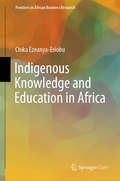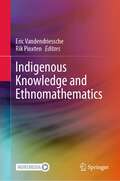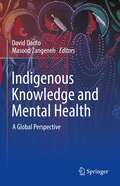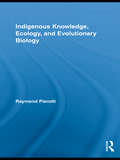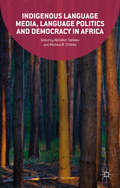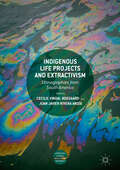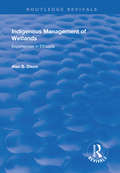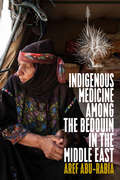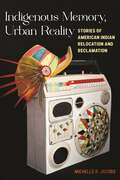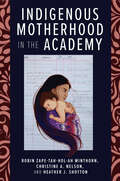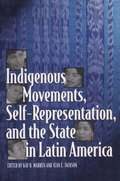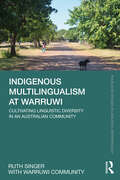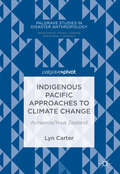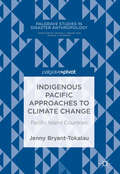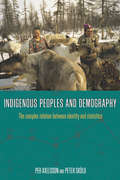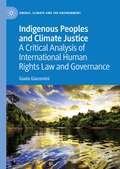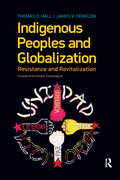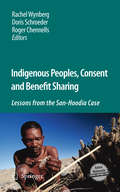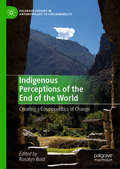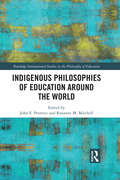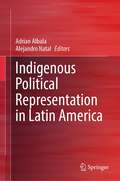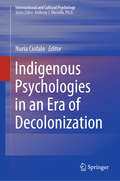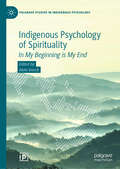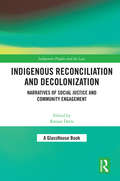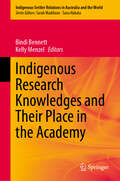- Table View
- List View
Indigenous Knowledge and Education in Africa (Frontiers in African Business Research)
by Chika Ezeanya-EsiobuThis open access book presents a strong philosophical, theoretical and practical argument for the mainstreaming of indigenous knowledge in curricula development, and in teaching and learning across the African continent. Since the dawn of political independence in Africa, there has been an ongoing search for the kind of education that will create a class of principled and innovative citizens who are sensitive to and committed to the needs of the continent. When indigenous or environment-generated knowledge forms the basis of learning in classrooms, learners are able to immediately connect their education with their lived reality. The result is much introspection, creativity and innovation across fields, sectors and disciplines, leading to societal transformation. Drawing on several theoretical assertions, examples from a wide range of disciplines, and experiences gathered from different continents at different points in history, the book establishes that for education to trigger the necessary transformation in Africa, it should be constructed on a strong foundation of learners’ indigenous knowledge.The book presents a distinct and uncharted pathway for Africa to advance sustainably through home-grown and grassroots based ideas, leading to advances in science and technology, growth of indigenous African business and the transformation of Africans into conscious and active participants in the continent’s progress. Indigenous Knowledge and Education in Africa is of interest to educators, entrepreneurs, policymakers, researchers and individuals engaged in finding sustainable and strategic solutions to regional and global advancement.
Indigenous Knowledge and Ethnomathematics
by Rik Pinxten Eric VandendriesscheThe book presents a series of ethnographic studies, which illustrate issues of wider importance, such as the role of cultural traditions, concepts and learning procedures in the development of formal (or mathematical) thinking outside of the western tradition. It focuses on research at the crossroads of anthropology and ethnomathematics to document indigenous mathematical knowledge and its inclusion in specific cultural patterns. More generally, the book demonstrates the heuristic value of crossing ethnographical, anthropological and ethnomathematical approaches to highlight and analyze—or "formalize" with a pedagogical outlook—indigenous mathematical knowledge.The book is divided into three parts. The first part extensively analyzes theoretical claims using particular ethnographic data, while revealing the structural mathematical features of different ludic, graphic, or technical/procedural practices in their links to other cultural phenomena. In the second part, new empirical studies that add data and perspectives from the body of studies on indigenous knowledge systems to the ongoing discussions in mathematics education in and for diverse cultural traditions are presented. This part considers, on the one hand, the Brazilian work in this field; on the other hand, it brings ethnographic innovation from other parts of the world. The third part comprises a broad philosophical discussion of the impact of intuitive or "ontological" premises on mathematical thinking and education in the light of recent developments within so-called indigenously inspired thinking. Finally, the editors’ conclusions aim to invite the broad and diversified field of scholars in this domain of research to seek alternative approaches for understanding mathematical reasoning and the adjacent adequate educational goals and means.This book is of interest to scholars and students in anthropology, ethnomathematics, history and philosophy of science, mathematics, and mathematics education, as well as other individuals interested in these topics.
Indigenous Knowledge and Mental Health: A Global Perspective
by Masood Zangeneh David DantoThis book brings together Indigenous and allied experts addressing mental health among Indigenous peoples across the traditional territories commonly known as the Americas (e.g. Canada, US, Caribbean Islands, Mexico, Bolivia, Venezuela, Ecuador and Brazil), Asia (e.g. China, Korea, Japan, Taiwan and Indonesia), Africa (e.g. South Africa, Central and West Africa) and Oceania (New Guinea and Australia) to exchange knowledge, perspectives and methods for mental health research and service delivery. Around the world, Indigenous peoples have experienced marginalization, rapid culture change and absorption into a global economy with little regard for their needs or autonomy. This cultural discontinuity has been linked to high rates of depression, substance abuse, suicide, and violence in many communities, with the most dramatic impact on youth. Nevertheless, Indigenous knowledge, tradition and practice have remained central to wellbeing, resilience and mental health in these populations. Such is the focus of this book.
Indigenous Knowledge, Ecology, and Evolutionary Biology: Indigenous Knowledge, Ecology, And Evolutionary Biology (Indigenous Peoples and Politics)
by Raymond PierottiIndigenous ways of understanding and interacting with the natural world are characterized as Traditional Ecological Knowledge (TEK), which derives from emphasizing relationships and connections among species. This book examines TEK and its strengths in relation to Western ecological knowledge and evolutionary philosophy. Pierotti takes a look at the scientific basis of this approach, focusing on different concepts of communities and connections among living entities, the importance of understanding the meaning of relatedness in both spiritual and biological creation, and a careful comparison with evolutionary ecology. The text examines the themes and principles informing this knowledge, and offers a look at the complexities of conducting research from an indigenous perspective.
Indigenous Language Media, Language Politics and Democracy in Africa
by Abiodun Salawu Monica Chibita SarantakosThis book deals with the often-neglected link between indigenous languages, media and democracy in Africa. It recognizes that the media plays an amplifying role that is vital to modern-day expression, public participation and democracy but that without the agency to harness media potential, many Africans will be excluded from public discourse.
Indigenous Life Projects and Extractivism: Ethnographies from South America (Approaches to Social Inequality and Difference)
by Cecilie Vindal Ødegaard Juan Javier Rivera AndíaExploring indigenous life projects in encounters with extractivism, the present open access volume discusses how current turbulences actualise questions of indigeneity, difference and ontological dynamics in the Andes and Amazonia. While studies of extractivism in South America often focus on wider national and international politics, this contribution instead provides ethnographic explorations of indigenous politics, perspectives and worlds, revealing loss and suffering as well as creative strategies to mediate the extralocal. Seeking to avoid conceptual imperialism or the imposition of exogenous categories, the chapters are grounded in the respective authors’ long-standing field research. The authors examine the reactions (from resistance to accommodation), consequences (from anticipation to rubble) and materials (from fossil fuel to water) diversely related to extractivism in rural and urban settings. How can Amerindian strategies to preserve localised communities in extractivist contexts contribute to ways of thinking otherwise?
Indigenous Management of Wetlands: Experiences in Ethiopia (Routledge Revivals)
by Alan DixonThis title was first published in 2003. There has been increasing recognition around the world that wetlands are fragile ecosystems which require sensitive and sustainable management if they are to continue to provide their range of functions and benefits. These functions and benefits, which include contributions to food security and environmental regulation, play a critical role in sustaining rural livelihoods in many developing countries. Drawing upon research carried out in the area, this book identifies and discusses the importance of wetlands to local communities in south-west Ethiopia, and in particular, how indigenous wetland management practices contribute to sustainable wetland use. As the basis of wetland management, particular attention is paid to the role of Indigenous Knowledge Systems, and how knowledge of wetland functioning is acquired, disseminated, developed and applied by local communities in their wetland management strategies. Critically, this community knowledge is examined in the context of scientific data, specifically that obtained from a wetland hydrology monitoring programme, thereby drawing attention to the strengths and weaknesses of both systems. This has major implications not only for the ways in which wetlands and other natural resources are managed at the local level, but also for the wider rural development strategies of governments and non-governmental organizations.
Indigenous Medicine among the Bedouin in the Middle East
by Aref Abu-RabiaModern medicine has penetrated Bedouin tribes in the course of rapid urbanization and education, but when serious illnesses strike, particularly in the case of incurable diseases, even educated people turn to traditional medicine for a remedy. Over the course of 30 years, the author gathered data on traditional Bedouin medicine among pastoral-nomadic, semi-nomadic, and settled tribes. Based on interviews with healers, clients, and other active participants in treatments, this book will contribute to renewed thinking about a synthesis between traditional and modern medicine - to their reciprocal enrichment.
Indigenous Memory, Urban Reality: Stories of American Indian Relocation and Reclamation
by Michelle R. JacobsContemporary accounts of urban Native identity in two pan-Indian communitiesIn the last half century, changing racial and cultural dynamics in the United States have caused an explosion in the number of people claiming to be American Indian, from just over half a million in 1960 to over three million in 2013. Additionally, seven out of ten American Indians live in or near cities, rather than in tribal communities, and that number is growing.In Indigenous Memory, Urban Reality, Michelle Jacobs examines the new reality of the American Indian urban experience. Drawing on ethnographic research conducted over two and a half years, Jacobs focuses on how some individuals are invested in reclaiming Indigenous identities whereas others are more invested in relocating their sense of self to the urban environment. These groups not only apply different meanings to indigeneity, but they also develop different strategies for asserting and maintaining Native identities in an urban space inundated with false memories and fake icons of “Indian-ness.” Jacobs shows that “Indianness” is a highly contested phenomenon among these two groups: some are accused of being "wannabes" who merely "play Indian," while others are accused of being exclusionary and "policing the boundaries of Indianness." Taken together, the interconnected stories of relocators and reclaimers expose the struggles of Indigenous and Indigenous-identified participants in urban pan-Indian communities. Indigenous Memory, Urban Reality offers a complicated portrait of who can rightfully claim and enact American Indian identities and what that tells us about how race is “made” today.
Indigenous Motherhood in the Academy
by Heather J. Shotton Charlotte Davidson Stephanie Waterman Christine A. Nelson Kaiwipuni Lipe Pearl Brower Nicole Reyes Miranda Belarde-Lewis Tiffany S. Lee Leola Tsinnajinnie-Paquin Susan Faircloth Nizhoni Chow-Garcia Michelle Johnson-Jennings Alayah Johnson-Jennings Ahnili Johnson-Jennings Dwanna L. McKay Shelly Lowe Tria Blu Wakpa Symphony Oxendine Denise Henning Renée Holt Robin Zape-tah-hol-ah Minthorn Otakuye Conroy-Ben Theresa Gregor Sloan Woska-pi-mi Shotton Erin Kahunawaika?ala WrightIndigenous Motherhood in the Academy highlights the experiences and narratives emerging from Indigenous mothers in the academy who are negotiating their roles in multiple contexts. The essays in this volume contribute to the broader higher education literature and the literature on Indigenous representation in the academy, filling a longtime gap that has excluded Indigenous women scholar voices. This book covers diverse topics such as the journey to motherhood, lessons through motherhood, acknowledging ancestors and grandparents in one’s mothering, how historical trauma and violence plague the past, and balancing mothering through the healing process. More specific to Indigenous motherhood in the academy is how culture and place impacts mothering (specifically, if Indigenous mothers are not in their traditional homelands as they raise their children), how academia impacts mothering, how mothering impacts scholarship, and how to negotiate loss and other complexities between motherhood and one’s role in the academy.
Indigenous Movements, Self-Representation, and the State in Latin America
by Kay B. Warren Jean E. JacksonThroughout Latin America, indigenous peoples are responding to state violence and pro-democracy social movements by asserting their rights to a greater measure of cultural autonomy and self-determination. <P><P>This volume's rich case studies of movements in Colombia, Guatemala, and Brazil weigh the degree of success achieved by indigenous leaders in influencing national agendas when governments display highly ambivalent attitudes about strengthening ethnic diversity.
Indigenous Multilingualism at Warruwi: Cultivating Linguistic Diversity in an Australian Community (Routledge Studies in Linguistic Anthropology)
by Ruth SingerThis book is an exploration of the role of language at Warruwi Community, a remote Indigenous settlement in northern Australia. It explores how language use and people’s ideas about language are embedded in contemporary Indigenous life there. Using an ethnographic approach, the book examines what language at Warruwi means in the context of the history of the community, ongoing social and political changes and the continuing importance of ancestral traditions. Children growing up at Warruwi still learn to speak many small Indigenous languages. This is remarkable not just in the Australian context, where many Indigenous languages are no longer spoken, but around the world as this kind of multilingualism in small languages persists only in a few remaining pockets. The way that people use many languages in their daily life at Warruwi reveals how high levels of linguistic diversity can be maintained in a small community. This detailed study of the creation of linguistic diversity is relevant to sociolinguistics, linguistic typology, historical linguistics and evolutionary linguistics. More generally, this book is for linguists, anthropologists and anyone with an interest in contemporary Australian Indigenous lives.
Indigenous Pacific Approaches to Climate Change: Aotearoa/New Zealand (Palgrave Studies in Disaster Anthropology)
by Lyn CarterSituating Māori Ecological Knowledge (MEK) within traditional environmental knowledge (TEK) frameworks, this book recognizes that indigenous ecological knowledge contributes to our understanding of how we live in our world (our world views), and in turn, the ways in which humans adapt to climate change. As an industrialized nation, Aotearoa/New Zealand (A/NZ) has responsibilities and obligations to other Pacific dwellers, including its indigenous populations. In this context, this book seeks to discuss how A/NZ can benefit from the wider Pacific strategies already in place; how to meet its global obligations to reducing GHG; and how A/NZ can utilize MEK to achieve substantial inroads into adaptation strategies and practices. In all respects, Māori tribal groups here are well-placed to be key players in adaptation strategies, policies, and practices that are referenced through Māori/Iwi traditional knowledge.
Indigenous Pacific Approaches to Climate Change: Pacific Island Countries
by Jenny Bryant-TokalauThis book explores how Pacific Island communities are responding to the challenges wrought by climate change—most notably fresh water accessibility, the growing threat of disease, and crop failure. The Pacific Island nations are not alone in facing these challenges, but their responses are unique in that they arise from traditional and community-based understandings of climate and disaster. Knowledge sharing, community education, and widespread participation in decision-making have promoted social resilience to such challenges across the Pacific. In this exploration of the Pacific Island countries, Bryant-Tokalau demonstrates that by understanding the inter-relatedness of local expertise, customary resource management, traditional knowledge and practice, as well as the roles of leaders and institutions, local “knowledge-practice-belief systems” can be used to inform adaptation to disasters wherever they occur.
Indigenous Peoples And Demography
by Peter Skold Per AxelssonWhen researchers want to study indigenous populations they are dependent upon the highly variable way in which states or territories enumerate, categorise and differentiate indigenous people. In this volume, anthropologists, historians, demographers and sociologists have come together for the first time to examine the historical and contemporary construct of indigenous people in a number of fascinating geographical contexts around the world, including Canada, the United States, Colombia, Russia, Scandinavia, the Balkans and Australia. Using historical and demographical evidence, the contributors explore the creation and validity of categories for enumerating indigenous populations, the use and misuse of ethnic markers, micro-demographic investigations, and demographic databases, and thereby show how the situation varies substantially between countries.
Indigenous Peoples and Climate Justice: A Critical Analysis of International Human Rights Law and Governance (Energy, Climate and the Environment)
by Giada GiacominiThis book provides a new interpretation of international law specifically dedicated to Indigenous peoples in the context of a climate justice approach. The book presents a critical analysis of past and current developments at the intersection of human rights and international environmental law and governance. The book suggests new ways forward and demonstrates the need for a paradigmatic shift that would enhance the meaningful participation of Indigenous peoples as fundamental actors in the conservation of biodiversity and in the fight against climate change. The book offers guidance on a number of critical intersecting and interdependent issues at the forefront of climate change law and policy – inside and outside of the UN climate change regime. The author suggests that the adoption of a critical perspective on international law is needed in order to highlight inherent structural and systemic issues of the international law regime which are all issues that ultimately impede the pursue of climate justice for Indigenous peoples.
Indigenous Peoples and Globalization: Resistance and Revitalization
by Thomas D. Hall James V. FenelonThe issues native peoples face intensify with globalization. Through case studies from around the world, Hall and Fenelon demonstrate how indigenous peoples? movements can only be understood by linking highly localized processes with larger global and historical forces. The authors show that indigenous peoples have been resisting and adapting to encounters with states for millennia. Unlike other antiglobalization activists, indigenous peoples primarily seek autonomy and the right to determine their own processes of adaptation and change, especially in relationship to their origin lands and community. The authors link their analyses to current understandings of the evolution of globalization.
Indigenous Peoples, Consent and Benefit Sharing: Lessons from the San-Hoodia Case
by Doris Schroeder Rachel Wynberg Roger ChennellsIndigenous Peoples, Consent and Benefit Sharing is the first in-depth account of the Hoodia bioprospecting case and use of San traditional knowledge, placing it in the global context of indigenous peoples' rights, consent and benefit-sharing. It is unique as the first interdisciplinary analysis of consent and benefit sharing in which philosophers apply their minds to questions of justice in the Convention on Biological Diversity (CBD), lawyers interrogate the use of intellectual property rights to protect traditional knowledge, environmental scientists analyse implications for national policies, anthropologists grapple with the commodification of knowledge and, uniquely, case experts from Asia, Australia and North America bring their collective expertise and experiences to bear on the San-Hoodia case.
Indigenous Perceptions of the End of the World: Creating a Cosmopolitics of Change (Palgrave Studies in Anthropology of Sustainability)
by Rosalyn BoldThis edited volume constructs a ‘cosmopolitics’ of climate change, consulting small-scale sustainable communities on whether the world is ending and why, and how we can take action to prevent it. By comparing scientific and indigenous accounts of the same phenomenon, contributors seek to broaden Western understandings of what climate change constitutes. In this context, existing cosmologies are challenged, opening spaces for hegemonic narratives to enter into conversation with the non-modern and construct ‘worlds otherwise’—situations of world change and renewal through climate change. Bold brings together perspectives from Central America, Mexico, the Amazon, and the Andes to converse with scientific narratives of climate change and create cracks that bring new worlds into being for readers.
Indigenous Philosophies of Education Around the World (Routledge International Studies in the Philosophy of Education #19)
by John E. Petrovic Roxanne M. MitchellThis volume explores conceptualizations of indigeneity and the ways that indigenous philosophies can and should inform educational policy and practice. Beginning with questions and philosophies of indigeneity itself, the volume then covers the indigenous philosophies and practices of a range of communities—including Sami, Maori, Walpiri, Navajo and Kokama peoples. Chapter authors examine how these different ideals can inform and create meaningful educational experiences for communities that reflect indigenous ways of life. By applying them in informing a philosophy of education that is particular and relevant to a given indigenous community, this study aims to help policy makers and educational practitioners create meaningful educational experiences.
Indigenous Political Representation in Latin America
by Adrian Albala Alejandro NatalThis book presents a comparative analysis of the struggles of Latin American indigenous peoples for effective representation in national political systems in the region. Through a detailed exploration of the political dynamics of indigenous groups and examples of mechanisms of political representation, the studies in this book reveal how power relations, cleavages and indigenous civil society organizations are essential to our understanding of indigenous political participation. These studies closely inspect how collective action builds up at local level in grassroots organizations, and how it then articulates or not with larger mechanisms of regional and national political representation, providing a more comprehensive and comparative assessment of why and when representation works and fails for indigenous people. This contributed volume is organized around one general and comparative chapter on indigenous political representation in Latin America followed by eight case studies, divided into three main groups. The first group includes cases with a more inclusive political environment, such as Bolivia, Ecuador and Guatemala. The second group brings together cases with certain representation and/or active indigenous elites: Colombia, Mexico, and Paraguay. Tthe third group presents outlier cases with potential indigenous issues: Peru and Chile. Finally, the last chapter brings together reflections on how mechanisms for effective political representation can be improved and how indigenous organizations can be fostered to ensure effective political representation. Indigenous Political Representation in Latin America will be of interest to political scientists, sociologists and anthropologists studying both indigenous collective action and political representation by presenting a discussion on how to structure representation mechanisms capable of politically integrate the ethnic diversity of Latin American countries in order to build a multicultural citizenship. It will also help policy makers and activists by discussing the successes and failures of effective indigenous political representation in Latin America.
Indigenous Psychologies in an Era of Decolonization (International and Cultural Psychology)
by Nuria CiofaloThis groundbreaking volume explores the capacity of Indigenous psychologies to counter the effects of longstanding colonization on traditional cultures and habitats. It chronicles the editor’s extensive research in the Lacandon Rainforest in southern Mexico, illustrating respectful methodologies and authentic friendship—a decolonized approach by a committed scholar—and the concerted efforts of community members to preserve their history and heritage. Descriptions of collaborations among children, parents, students, and elders demonstrate the continued passing on of indigenous knowledge, culture, art, and spirituality. This richly layered narrative models cultural resilience and resistance in their transformative power to replace environmental and cultural degradation with co-existence and partnership.Included in the coverage:• Indigenous psychologies: a contestation for epistemic justice. • The ecological context and the methods of inquiry and praxes.• Environmental impact assessment of deforestation in three communities of the Lacandon Rainforest.• Public policy development for community and ecological wellbeing. • Oral history, legends, myths, poetry, and images. With stirring examples to inspire future practices and policies, Indigenous Psychologies in an Era of Decolonization will take its place as a bedrock text for indigenous psychology and community psychology researchers. It speaks needed truths as the world comes to grips with pressing issues of environmental preservation, restorative justice for marginalized peoples, and the waging of peace over conflict.
Indigenous Psychology of Spirituality: In My Beginning is My End (Palgrave Studies in Indigenous Psychology)
by Alvin DueckThis book presents cutting-edge research and theory in the emerging field of the indigenous psychology of religion. Its authors examine the influence of colonization and illustrate the use of novel research methodologies utilised in studies with communities in India, Korea, China, Indonesia, America, and Poland. Whereas Western psychology has traditionally viewed religion through an institutional lens and from a Euro-American perspective, this book aims to facilitate an understanding of indigenous spiritualities on their own terms and from the indigenous people’s lived experience. In doing so, the contributors seek to support indigenous communities in the recovery of their voice, original vision, and ancient practices, and to follow their yearning as echoed in T. S. Eliot’s words: “In my beginning is my end.” The book is replete with examples of this recovery of indigeneity in, for example, Chinese notions of harmony and resilience; cultural differences in hearing the voice of the divine; the influence of animism on Christians in Korea; and in savoring the bereavement of loved ones. This novel collection presents fresh insights for students and scholars of the psychology of religion, indigenous studies, cultural psychology, and anthropology.
Indigenous Reconciliation and Decolonization: Narratives of Social Justice and Community Engagement (Indigenous Peoples and the Law)
by Ranjan DattaThis book addresses the ethical and practical issues at stake in the reconciliation of Indigenous and non-indigenous communities. An increasing number of researchers, educators, and social and environmental activists are eager to find ways to effectively support ongoing attempts to recognize, integrate and promote Indigenous perspectives and communities. Taking Canada as its focus, this book offers a multidisciplinary consideration of a range of reconciliation policies, practices and initiatives that are relevant in all settler states. Set against its increasing neoliberal appropriation, the book resituates reconciliation in the everyday contexts of community interaction and engagement, as well as in the important areas of Indigenous knowledge, resource management and social and environmental justice. Reconciliation is not just the responsibility of law and government. And, attuned to the different perspectives of settlers, migrants and refugee communities, the book examines areas of opportunity, as well as obstacles to progress, in the forging of a truly decolonizing framework for reconciliation. As the challenges of reconciliation cross numerous academic and substantial areas, this book will appeal to a range of scholars and practitioners working in law, politics, education, environmental studies, anthropology and Indigenous studies.
Indigenous Research Knowledges and Their Place in the Academy (Indigenous-Settler Relations in Australia and the World #7)
by Bindi Bennett Kelly MenzelThis book privileges Indigenous ways of knowing, being and doing in research and serves as a voice in taking on some of the more marginal topics within methodologies. It is significant in that it is written by indigenous scholars themselves. The contributors shed light, for example, on Queer BlaQ bodies and place Indigenous women as central in reimagining fair academic practice; others return to their foundational texts to reflect on the growth of Indigenous Standpoint Theory. This book sees Indigenous Peoples as holding greater significance within research objectives and institutional practices and reimagines a research world embracing storytelling as foundational to academia. It is intended for students and early researchers, particularly Indigenous researchers, whilst also serving as an invaluable textbook for non-Indigenous people as it aids in explaining and outlining Indigenous research and is a valuable tool in the classroom and with research students. It demonstrates that Indigenous research approaches can sit beside and be equal to Western research, especially when engaging with the ethics process and for PhD students. This book is invaluable for non-Indigenous allies and researchers globally to further explain and outline Aboriginal (Australian) Indigenous research.
